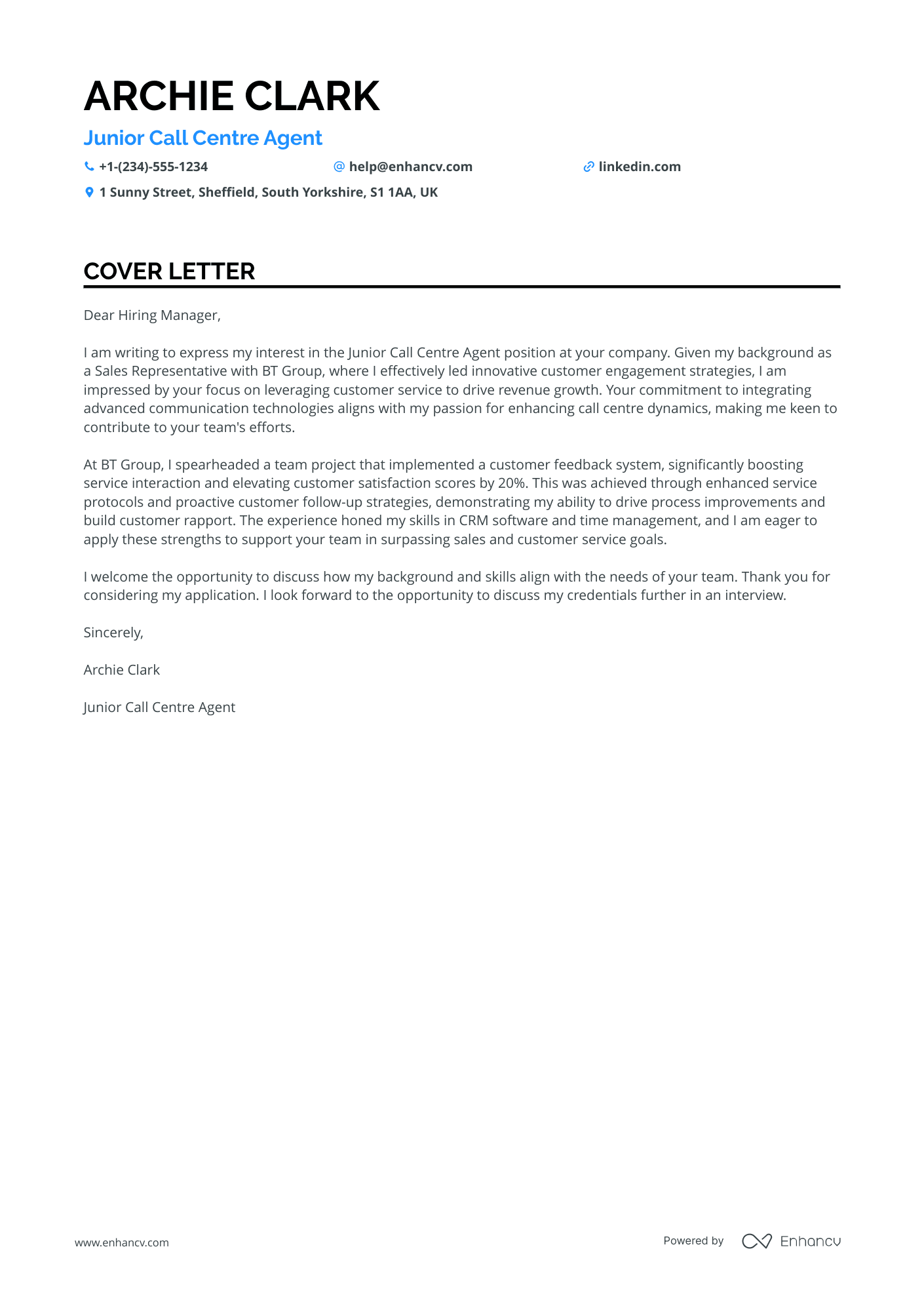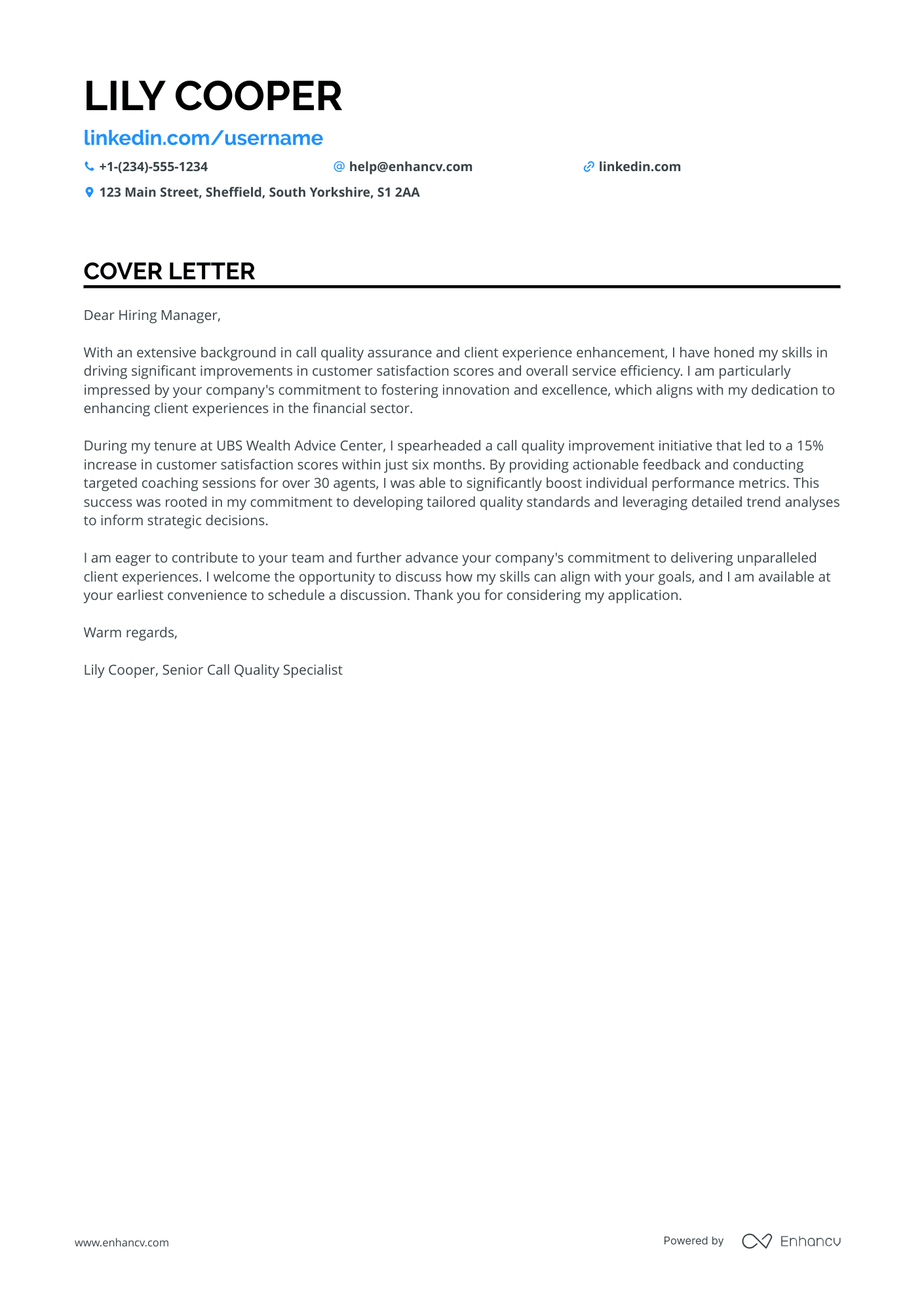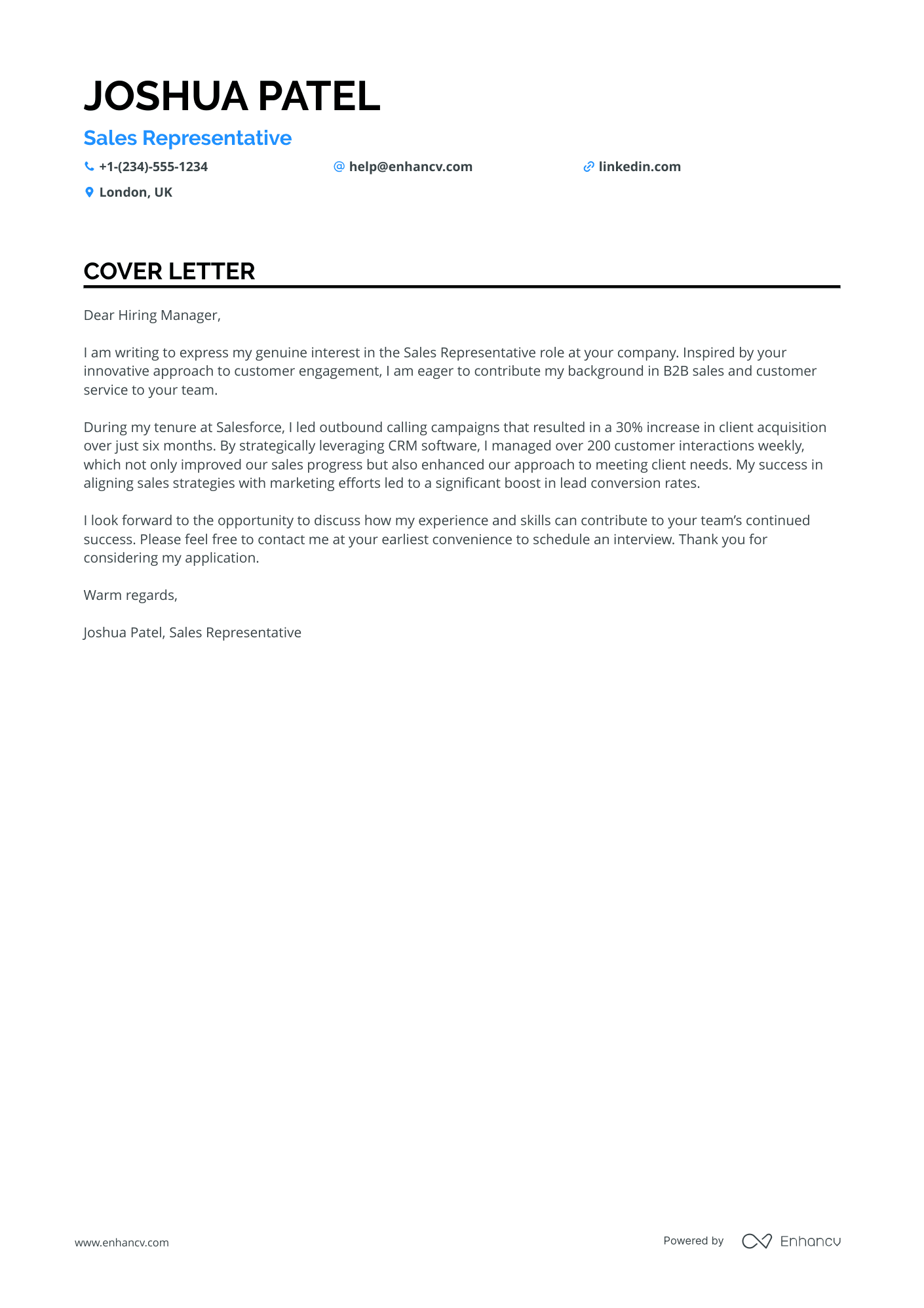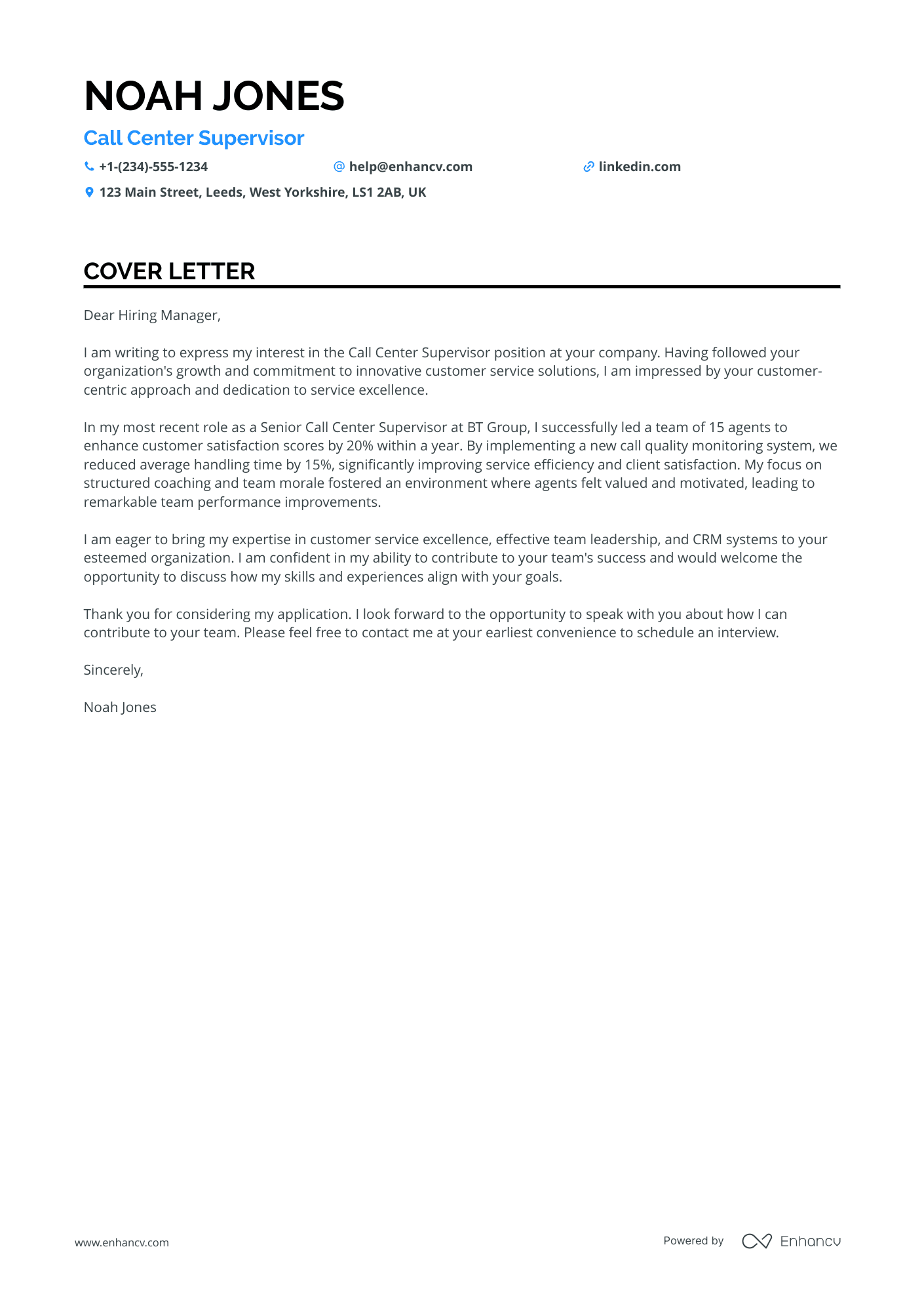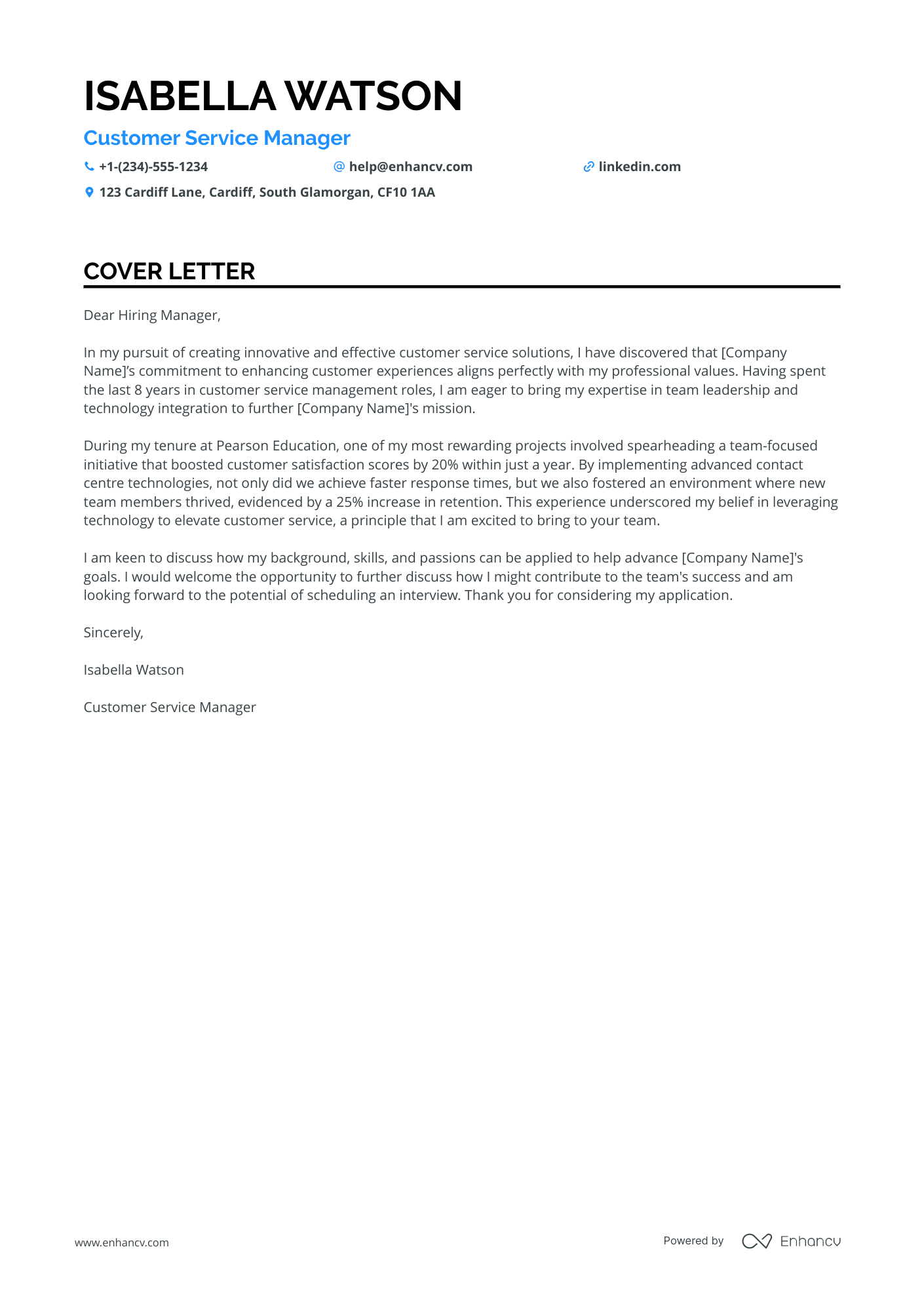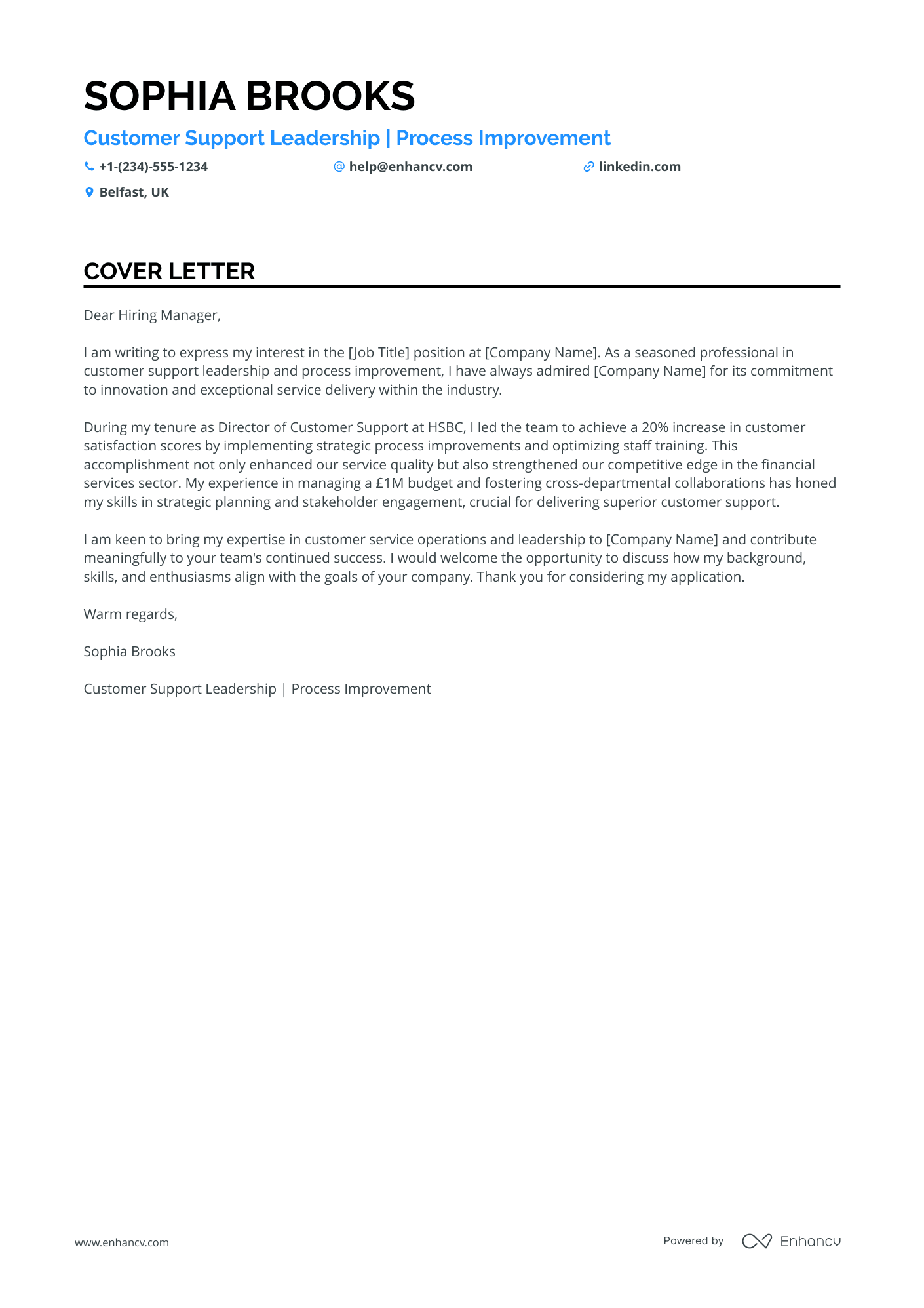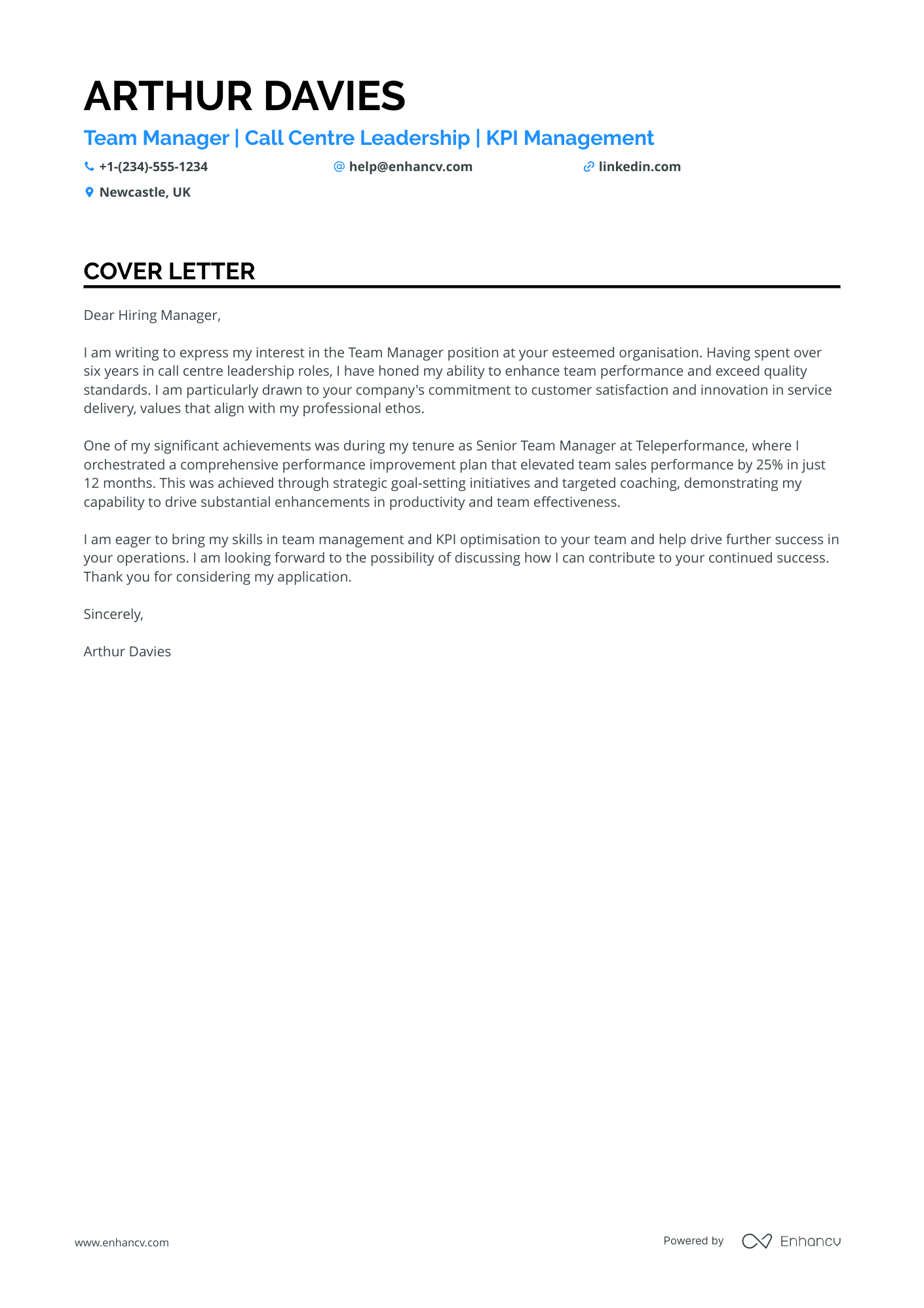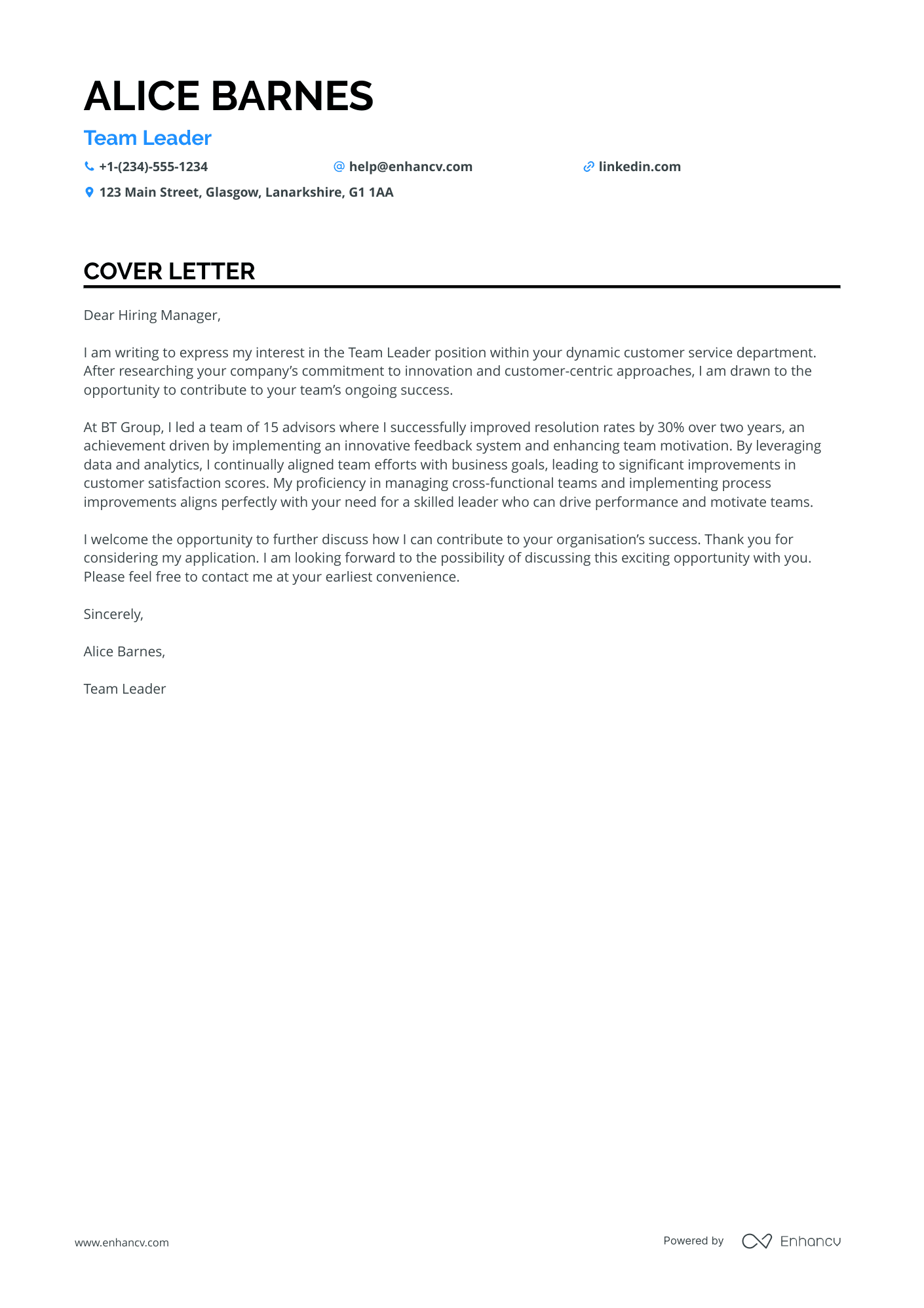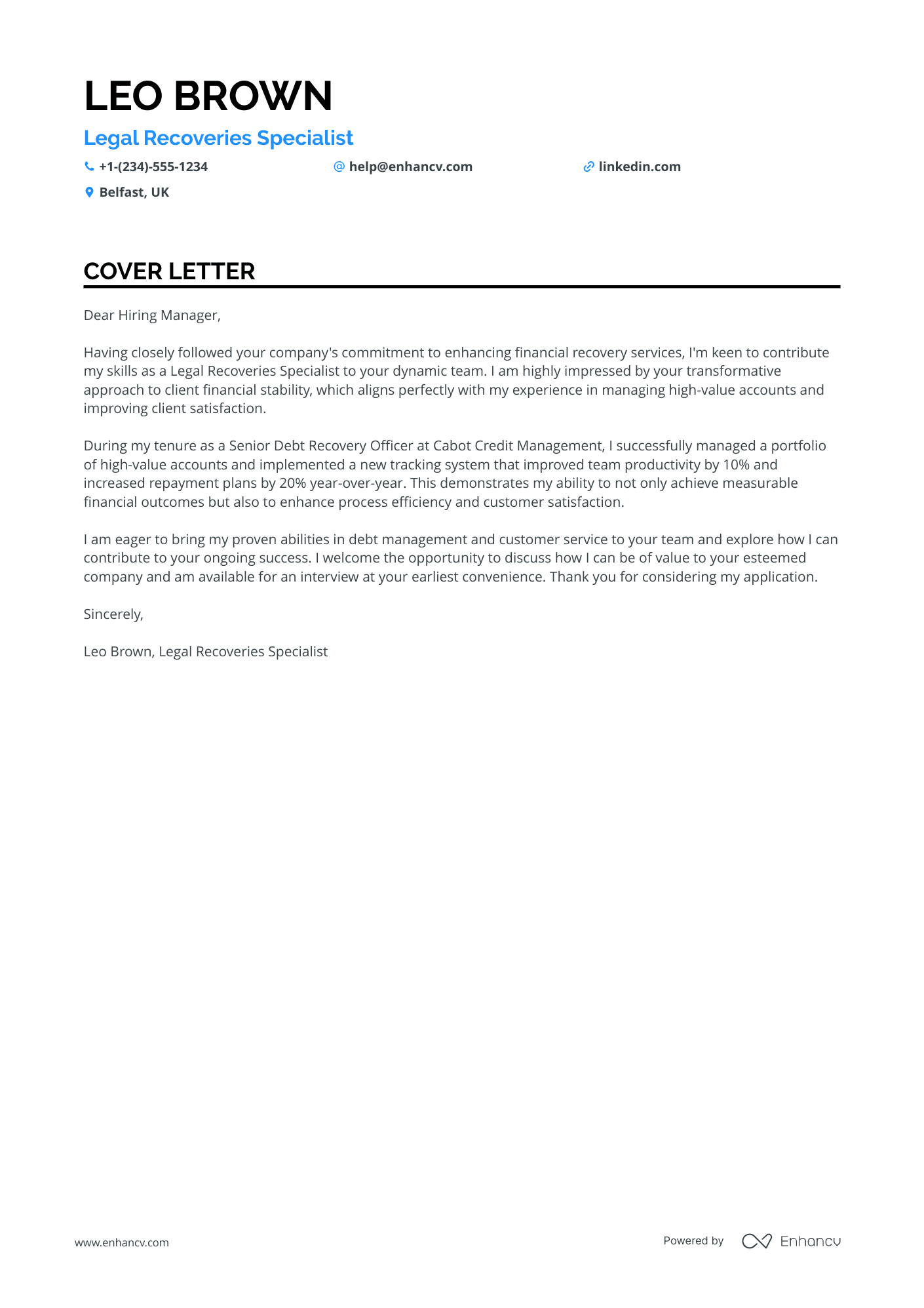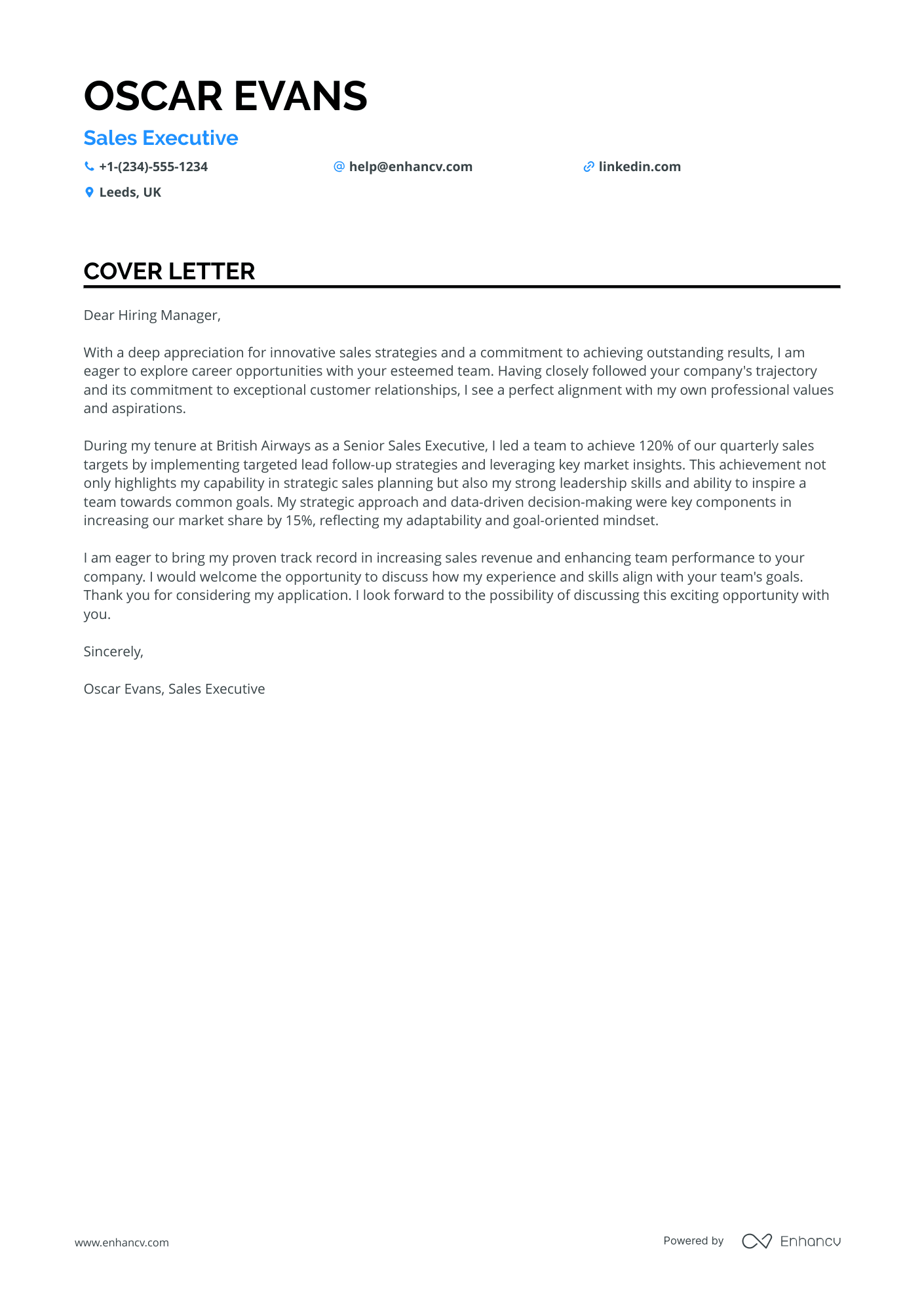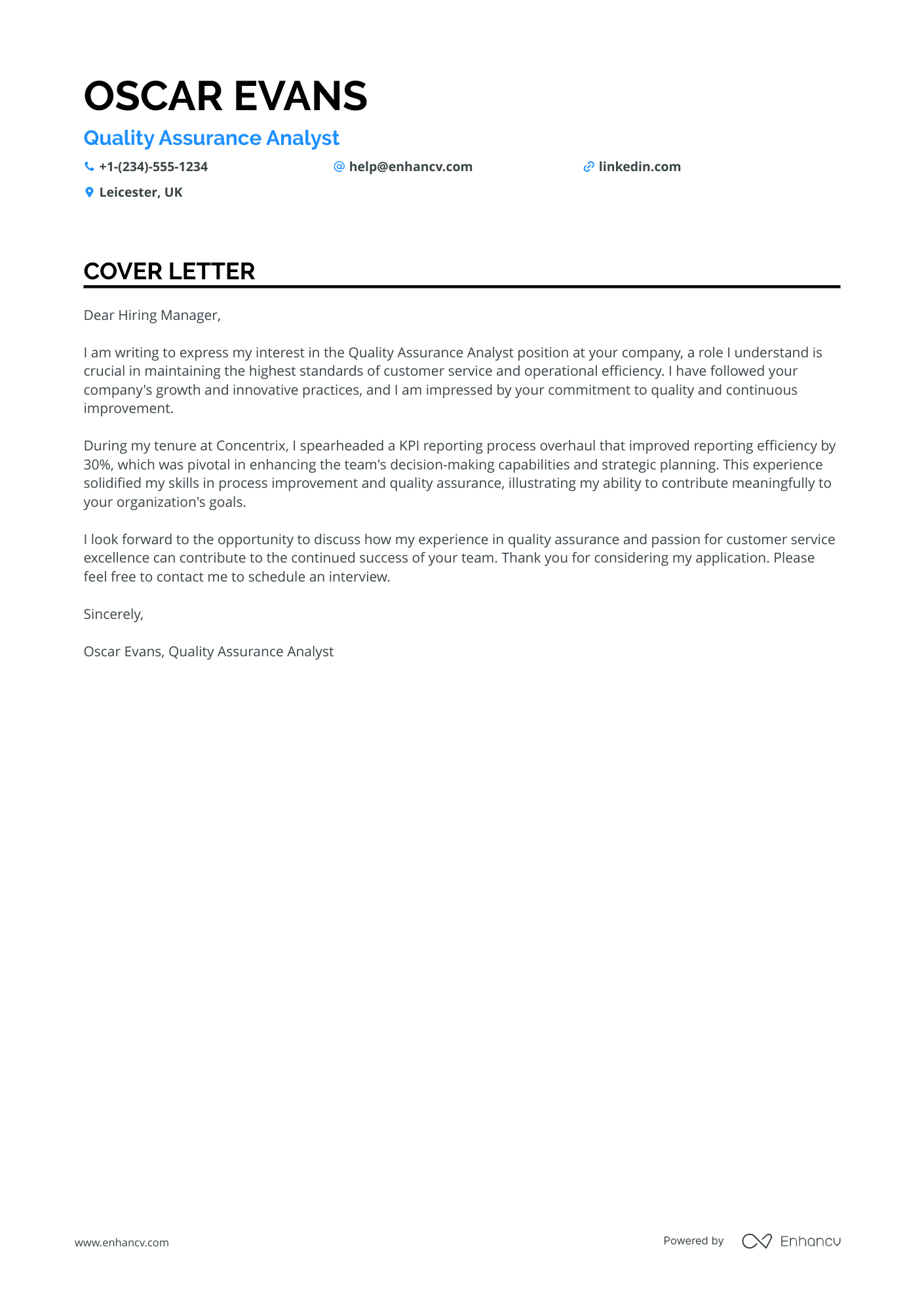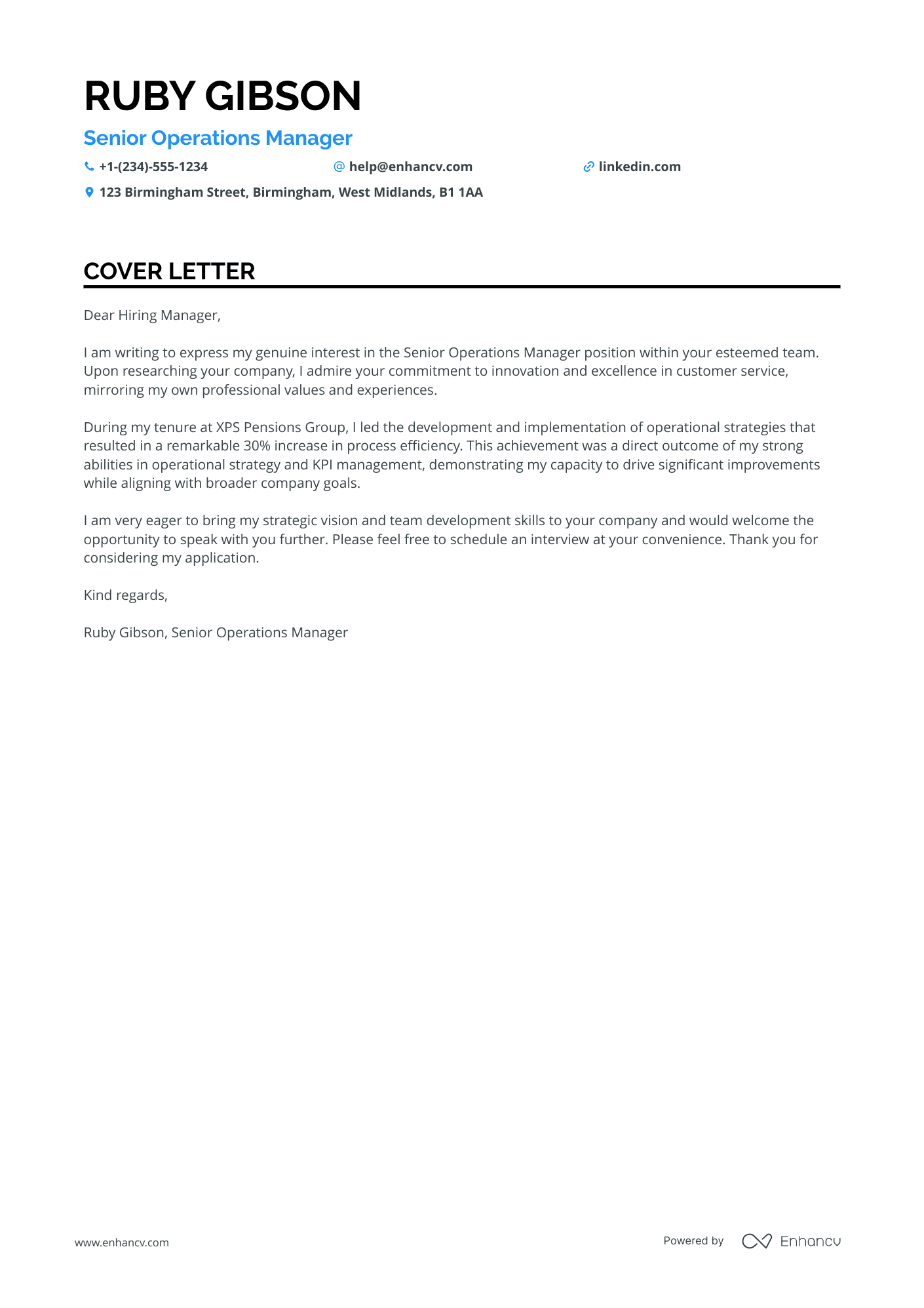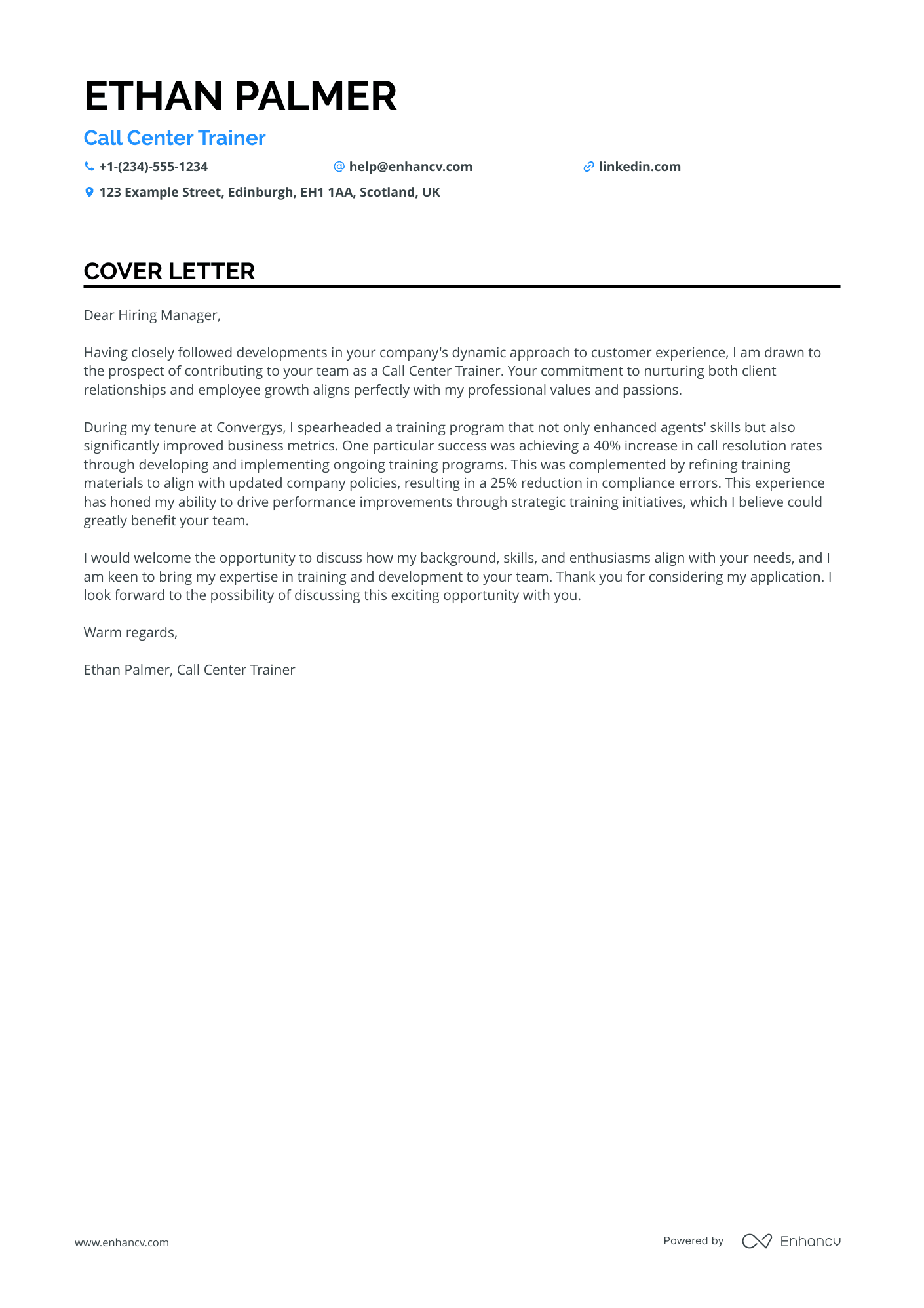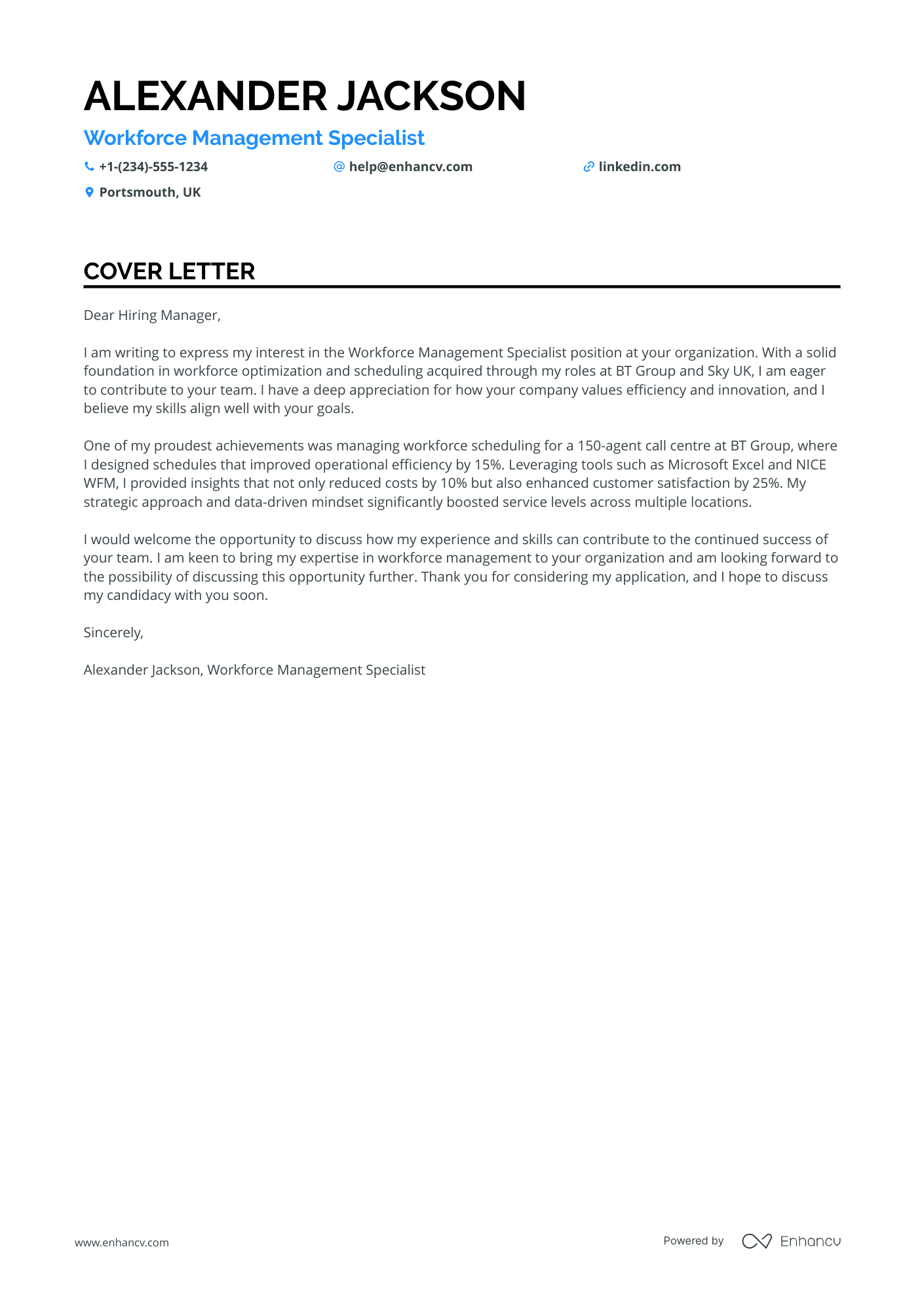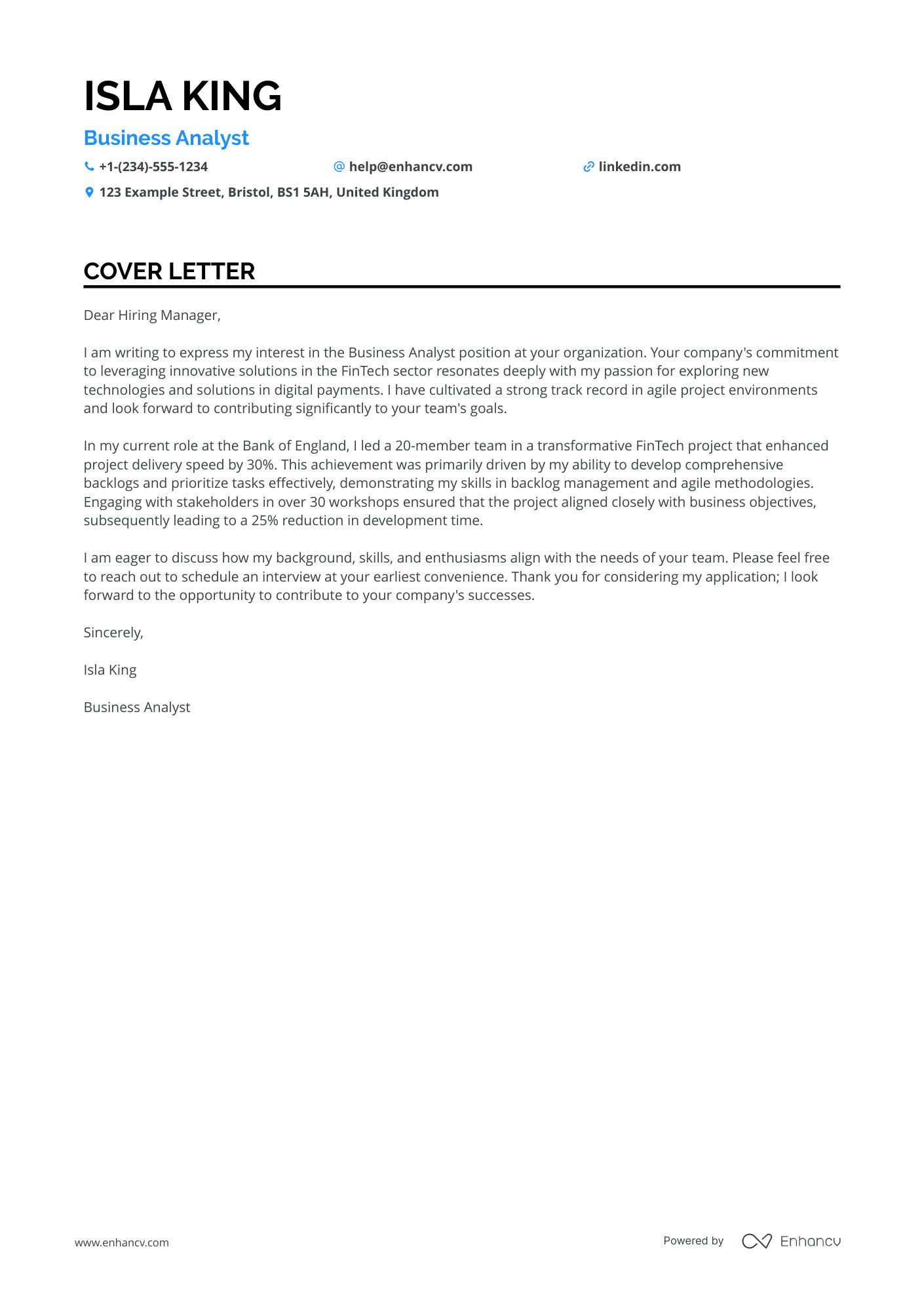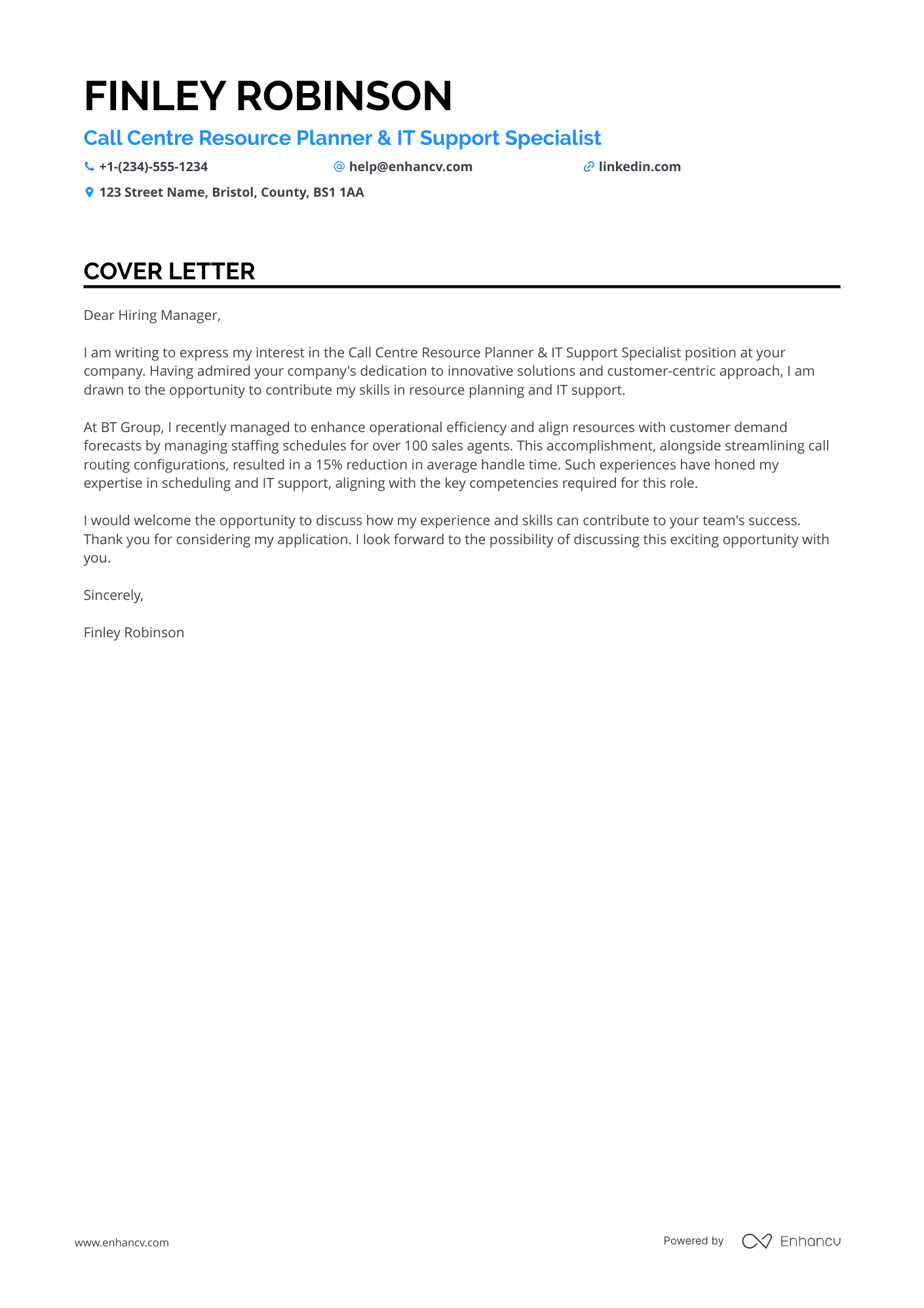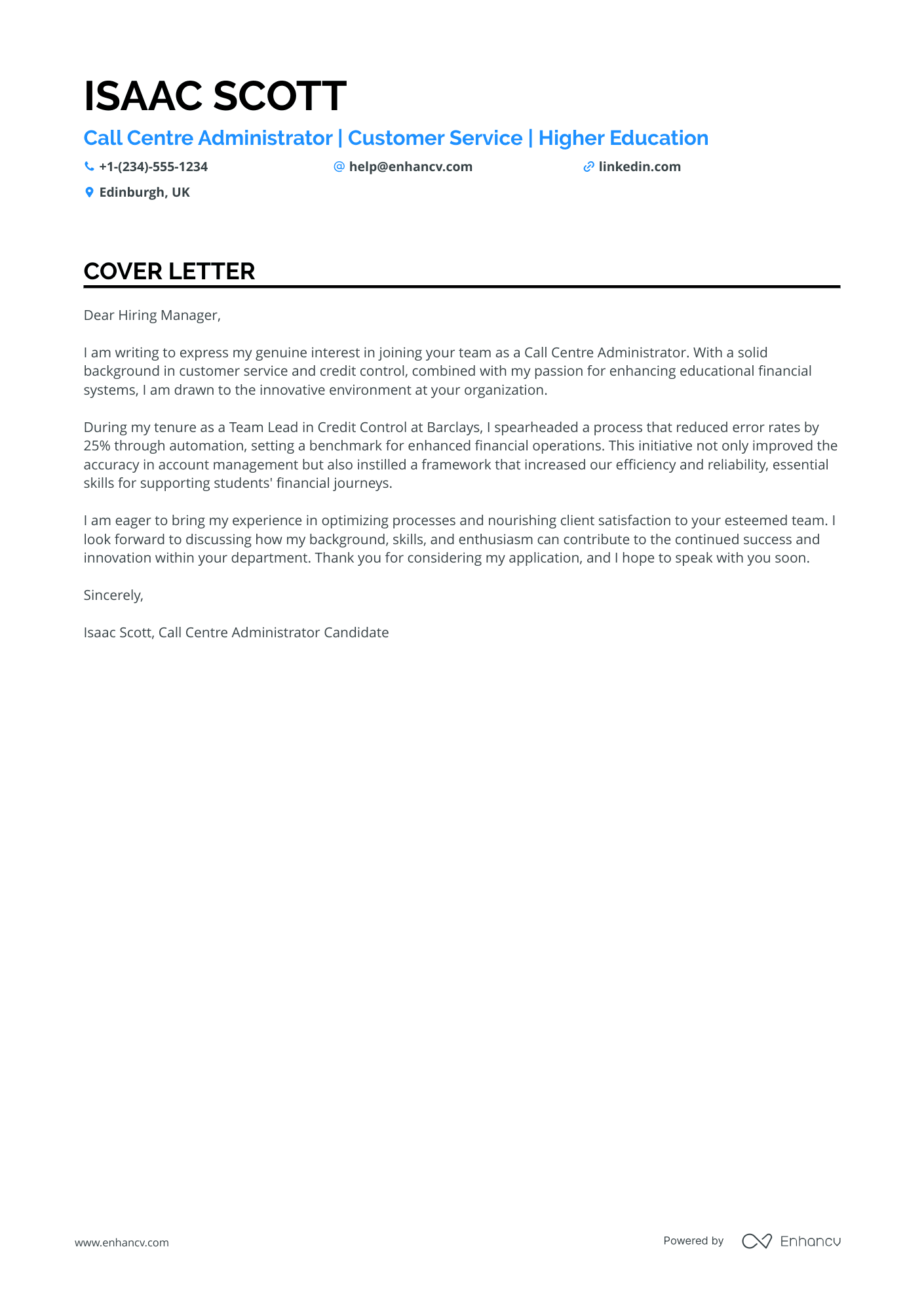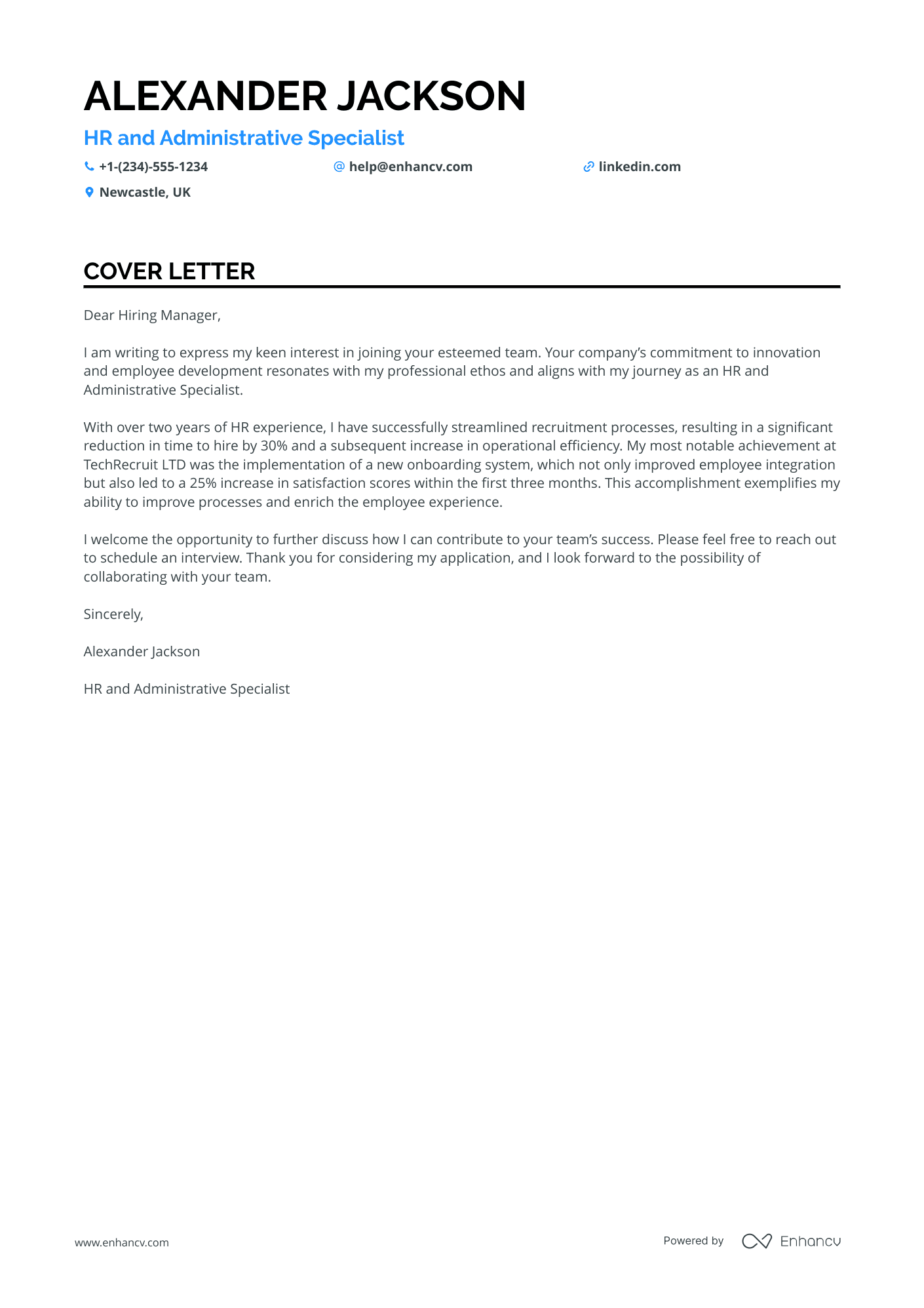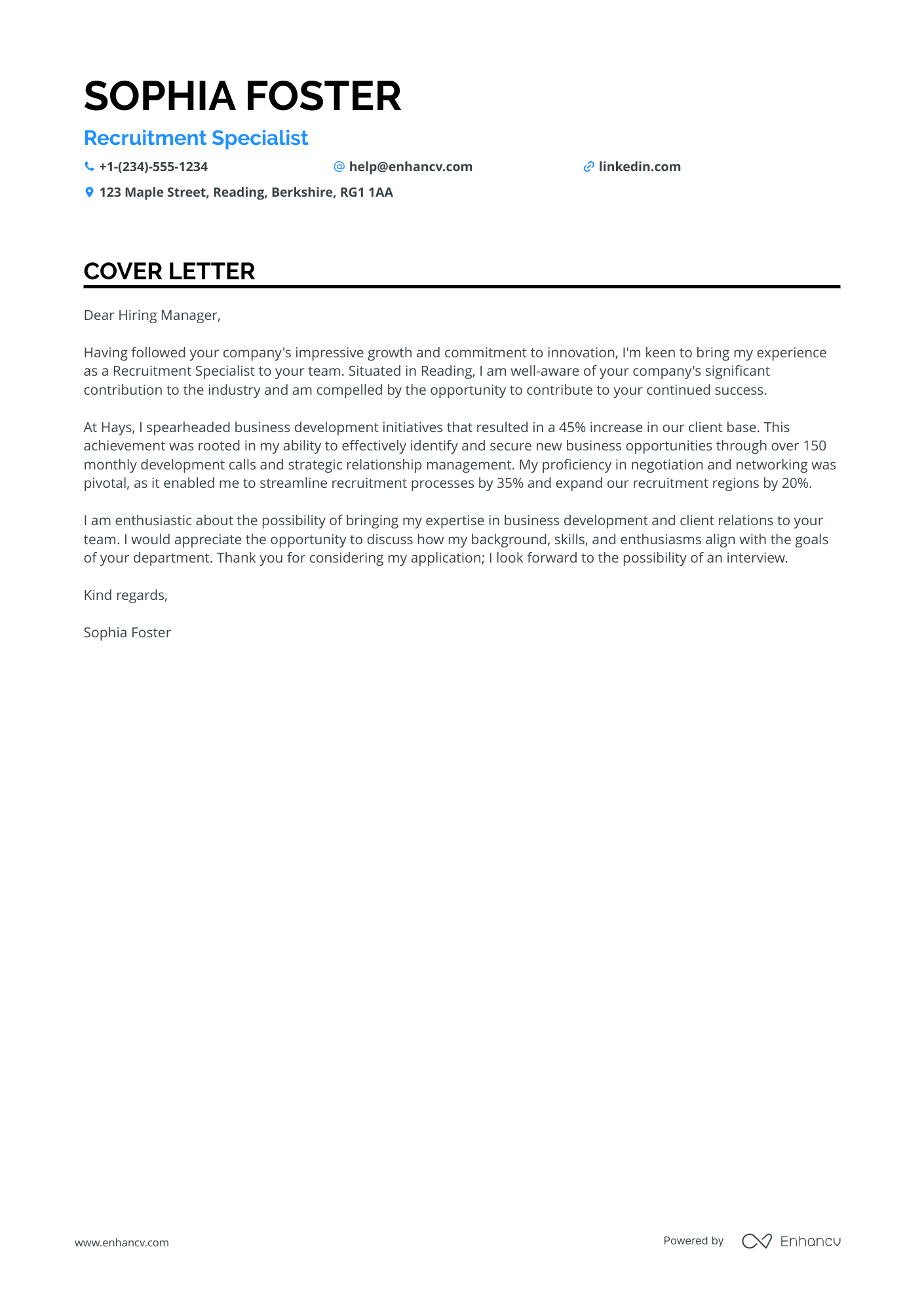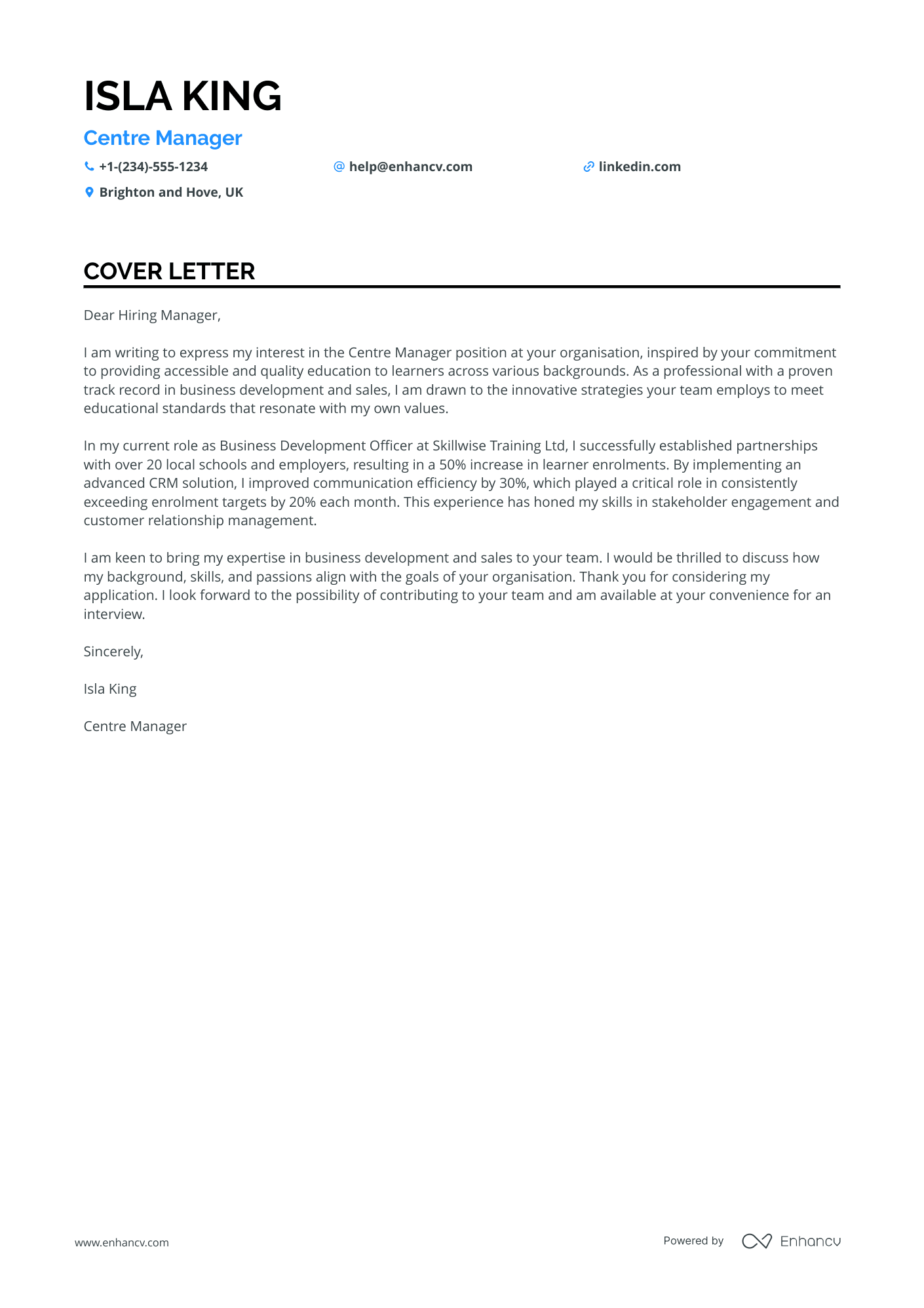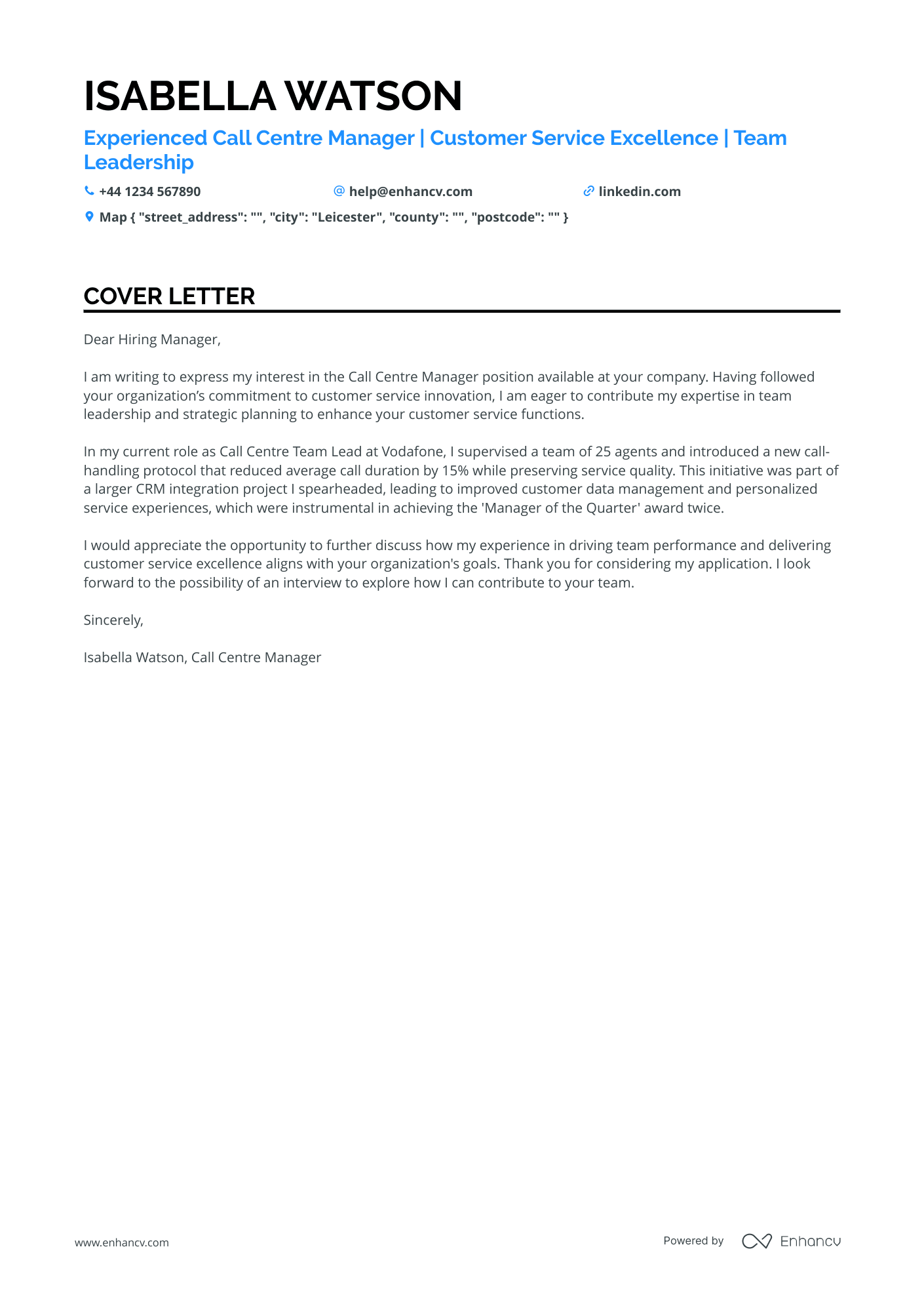When you start applying for jobs, you quickly realise that including a cover letter with your CV is a excellent way to stand out. But what should your cover letter focus on?
Should it emphasise your key achievements or simply list your responsibilities? And how can you effectively demonstrate that you're the ideal fit for the role?
One of the most common mistakes candidates make is either underselling themselves or overstating their experience.
In this guide, you’ll learn how to craft a compelling cover letter by showcasing your most significant professional achievement and telling the story behind it.
Cover letter examples for call centre
By Experience
Junior Call Centre Agent
- Highlight Relevant Experience: The cover letter successfully emphasises Archie's 3 years of experience in sales and customer service, making it highly relevant for a Junior Call Centre Agent role.
- Quantifiable Achievements: The use of specific metrics, like a 30% increase in customer retention and exceeding sales goals by 15%, demonstrates proven success and tangible results in previous roles.
- Skills and Professional Development: The inclusion of completed courses, like "Effective Communication in Sales" from The Open University, showcases a commitment to professional growth and aligns well with the skills required for the position.
- Strong Focus on Customer Interaction: The mention of skills such as CRM software proficiency and initiatives in improving customer satisfaction underscores Archie's capability to enhance customer relations, a crucial aspect for call centre roles.
Senior Call Centre Agent
- Highlighting Relevant Experience: The cover letter effectively showcases over 8 years of experience in call quality assurance, focusing on client experience enhancement and financial coaching, which is critical for a Senior Call Quality Specialist role.
- Emphasising Achievements and Impact: Detailed accomplishments such as a 15% increase in customer satisfaction scores and a 20% improvement in individual performance ratings clearly demonstrate the applicant’s positive impact on organisational performance.
- Relevant Certifications and Education: Listing courses like "Advanced Call Quality Management" and degrees such as an MBA from the University of Sheffield illustrate both specialised knowledge and sustained academic achievement in fields applicable to this role.
- Skills and Competencies: Skills such as ‘Call Quality Evaluation’ and ‘Client Experience Enhancement’ align closely with the job requirements, showing the applicant’s capability to meet and exceed the needs of a Senior Call Quality Specialist position.
Entry-Level Call Centre Operator
- Highlighting specific sales achievements with measurable outcomes, like a 30% increase in client acquisition or £500,000 in revenue, is critical for demonstrating success in a sales role.
- Showcasing skills in CRM software and customer relationship management effectively positions the candidate as capable of managing and enhancing customer interactions, a key aspect for Sales and Marketing roles.
- Including experience in aligning sales strategies with marketing efforts illustrates an understanding of cross-functional teamwork, which is advantageous for roles that require coordination between departments.
- Emphasising awards and recognitions for sales and customer service excellence establishes credibility and past accomplishments, appealing to employers seeking high-achieving candidates.
Experienced Call Centre Supervisor
- Highlighting Achievements: The cover letter effectively quantifies achievements, such as a 20% improvement in customer satisfaction scores and a 15% reduction in average handling time, which are crucial for showcasing tangible results in customer service roles.
- Emphasising Leadership and Team Development: It underscores the candidate's leadership skills by detailing their experience in supervising and developing call centre teams, which is essential for a Call Centre Supervisor position.
- Showcasing Relevant Certifications: The inclusion of certifications like "CRM Systems Efficiency" from HubSpot Academy is significant, as it demonstrates a commitment to professional development and expertise in customer interaction management tools.
- Passion for Innovation: Expressing a keen interest in "Customer Service Innovation" highlights the candidate's proactive approach to improving customer service processes, a valuable trait for roles focused on enhancing customer experience.
Call Centre Team Lead
- Emphasise Relevant Experience: The cover letter effectively highlights the candidate's extensive experience in customer service management, showcasing their ability to improve customer satisfaction and leadership skills.
- Highlight Certifications and Courses: Showcasing specific courses and certifications, such as the Advanced Customer Service Leadership programme and Data-Driven Decision Making course, enhances the applicant's qualifications and commitment to ongoing professional development.
- Quantifiable Achievements: Including measurable achievements, such as improving customer satisfaction scores by 20% and reducing first response times by 15%, provides concrete evidence of the applicant's capabilities.
- Showcase Passion: Demonstrating personal interests and passions, such as a keen interest in educational technology and community volunteering, gives an insight into the candidate's motivation and alignment with the company's values.
Call Centre Operations Director
- Relevant Experience: The cover letter effectively showcases Sophia Brooks' extensive experience in customer support leadership roles across prestigious banking institutions, including HSBC, Barclays, and Lloyds Bank. This highlights her capability in this sector.
- Specific Achievements: It features quantifiable achievements like a 20% increase in customer satisfaction and improved call centre performance, which support her claims of competence and leadership skills.
- Education and Certifications: The mention of a Master of Business Administration and certification in Call Centre Management showcases her formal education and specialised training, which is relevant and beneficial for the role.
- Technological and Process Improvement Focus: Sophia's emphasis on process improvements, strategic operations, and leveraging technology to enhance customer interactions indicates her alignment with modern customer service expectations and trends.
By Role
Call Centre Manager
- Emphasising leadership skills with specific achievements, such as increasing team sales performance by 25%, demonstrates a proven track record in managing and optimising team productivity, essential for a Team Manager role.
- Highlighting experience in KPI optimisation and quality assurance implementations reflects the ability to maintain and exceed quality standards, which is crucial in call centre leadership.
- Noting the completion of relevant courses like "Advanced Performance Management" showcases a commitment to continued professional development and mastery of performance strategies.
- Showcasing successful past recruitment optimisations and client satisfaction improvements provides evidence of ability to enhance operational efficiency and maintain strong client relationships.
Call Centre Team Leader
- Highlight Relevant Experience: Alice emphasises her leadership roles and achievements in customer service management, showcasing her capability to drive performance improvements and team motivation. This is crucial for a role that demands strong team leadership and customer interaction skills.
- Quantifiable Achievements: The cover letter effectively uses specific figures and percentages to demonstrate success, such as a 30% improvement in resolution rates and a 25% increase in customer satisfaction scores. This adds credibility and impact, showing potential employers the tangible results of her efforts.
- Industry-Specific Courses and Certifications: Mentioning courses like "Advanced Call Centre Management" and "Customer Experience Management" underscores her commitment to ongoing professional development in customer service, which is highly relevant for a customer service leadership role.
- Passion and Drive: Alice's mention of passions like "Digital Transformation" and "Building High-Performance Teams" aligns with the evolving nature of customer service roles and the need for innovative strategies, appealing to employers looking for forward-thinking leaders.
Call Centre Customer Service Representative
- Emphasis on experience and achievements in financial recoveries demonstrates the candidate's capability to drive results in debt management and recoveries, making it highly relevant to a Legal Recoveries Specialist role.
- Mention of the Master of Business Administration (MBA) degree from Queen's University Belfast underscores a solid foundation in business principles, which is a valuable asset in managing complex financial cases and leading strategic initiatives.
- Inclusion of advanced negotiation and financial risk management courses highlights specialised skills that are crucial for effective client communication and successful debt recovery.
- Listing of languages (English and Spanish) enhances the candidate's profile by suggesting an ability to interact with a diverse client base, potentially increasing outreach and improving customer relations.
Call Centre Sales Agent
- Emphasising a proven track record in sales by showcasing a 40% increase in sales targets at the previous position, demonstrating effectiveness in achieving and exceeding goals.
- Highlighting leadership qualities by noting the successful management of sales teams and the implementation of programmes that boost team productivity and business performance.
- Illustrating the importance of technological proficiency by mentioning the integration and optimisation of CRM systems, showing an ability to enhance the sales process through data-driven insights.
- Leveraging educational background and specialised courses, such as an MBA and certifications in advanced sales strategies, to underscore strategic planning and execution capabilities within the sales domain.
Call Centre Quality Assurance Analyst
- Highlight the applicant's experience in improving KPIs, as this showcases their ability to enhance operational efficiency, which is crucial for a Quality Assurance Analyst role.
- Emphasise leadership skills demonstrated through leading call review sessions and developing training programmes, which are important for roles that require managing and improving team performance.
- Detail achievements such as the "Excellence in Customer Service" award, which underscores the applicant's commitment to quality service, a key component in customer service roles.
- Mention relevant certifications such as the "Quality Assurance Leadership Course," indicating continuous professional development and specialised skills in quality assurance processes.
Call Centre Operations Manager
- Highlighted Experience: Ruby clearly outlines her extensive experience as a Senior Operations Manager, emphasising a 20% performance boost in her teams, which is crucial for showcasing her capability to lead and enhance team efficiency.
- Specific Achievements: The cover letter effectively details specific achievements such as a 30% increase in process efficiency and a 10% cost-saving initiative, providing concrete examples of her skills in improving operational processes.
- Relevant Skills: Skills such as 'Operational Strategy', 'KPI Management', and 'Stakeholder Engagement' are prominently featured, underlining key competencies required for the role of Senior Operations Manager in a contact centre or pensions environment.
- Professional Development: The mention of industry-relevant courses like 'Advanced Contact Centre Management' and certifications from the Pensions Management Institute adds credibility and highlights ongoing professional development in her field.
Call Centre Training Specialist
- Emphasising relevant experience is crucial, as demonstrated by highlighting roles like Call Centre Trainer and Customer Service Team Lead, showcasing direct experience in the sector.
- Quantifying achievements with specific metrics, such as a 95% retention rate and a 40% increase in call resolution rates, provides concrete evidence of impact and success.
- Including certifications, like "Train the Trainer Certification", underlines specialised qualifications that are highly pertinent to the training and onboarding functions.
- Highlighting key skills such as “Problem-solving” and “Facilitation” ties directly to the role’s requirements and showcases ability to handle challenges efficiently.
Call Centre Workforce Planner
- Highlighting Achievements: The cover letter effectively outlines specific achievements such as a 20% improvement in service levels and a reduction in scheduling errors, showcasing a track record of success.
- Relevant Skills and Tools: Emphasises proficiency with key WFM tools like Microsoft Excel and NICE WFM, which are critical for a Workforce Management Specialist role.
- Quantifiable Results: The document provides quantified outcomes, such as cost reductions of £50,000 and a 25% increase in customer satisfaction, demonstrating the applicant's impact on previous employers.
- Educational Background: Citing advanced education, such as an MBA, supports the applicant's capacity for strategic planning and management responsibilities.
Call Centre Business Analyst
- Relevant Experience: The cover letter proficiently showcases over 3 years of specific experience in business analysis and agile environments, which directly aligns with the role's requirements.
- Measurable Achievements: It effectively highlights quantifiable accomplishments such as a 30% increase in project delivery efficiency and a 25% reduction in development time, demonstrating impact and capability.
- Certification and Skills: Featuring certifications such as Certified ScrumMaster (CSM) and skills in Agile Methodologies underscores proficiency in key industry practices.
- Stakeholder Engagement: The letter includes specific instances of stakeholder management, such as engaging with stakeholders in over 30 workshops, reflecting strong interpersonal and communication skills essential for the role.
Call Centre IT Support Specialist
- Highlighting specific certifications such as the Advanced IT Support Technician, which can enhance credibility in technical troubleshooting and IT systems management for a Call Centre Resource Planner & IT Support Specialist role.
- Emphasising relevant experience in managing staffing schedules and optimising workforce deployment, which directly correlates to improving operational efficiency and aligning resources with customer demands.
- Detailing specific achievements like reducing IT system downtime by 40% and improving ticket resolution time by 25%, showcasing quantifiable impacts and the ability to deliver results that enhance team efficiency and user satisfaction.
- Underscoring skills in CRM and telephony systems integration, as these competencies are critical for boosting overall agent performance and optimising call centre operations.
Call Centre Administrator
- Emphasise Relevant Experience: Highlight specific roles and achievements that align with the Call Centre Administrator position, such as leadership roles in credit control and customer service management, showcasing expertise in reducing overdue accounts and improving customer satisfaction.
- Demonstrate Skill Proficiency: Tailor the cover letter to showcase skills pertinent to the role, such as IT proficiency, numeracy skills, and call centre management, emphasising successes like implementing automated processes and improving effectiveness.
- Highlight Educational Credentials: Mention higher education qualifications, such as an MSc in Financial Management, to underscore a strong academic foundation that complements professional skills, particularly in financial management and strategy.
- Showcase Passion for Sector: Express enthusiasm for improving student support services and a passion for digital innovation, indicating a proactive approach to enhancing operational efficiency and service delivery within higher education contexts.
Call Centre HR Officer
- Emphasise the candidate's success in optimising recruitment processes, which showcases significant improvements in both efficiency and operational impact, such as the 30% reduction in time to hire.
- Highlight the implementation of a new onboarding system that not only improved employee integration but also increased satisfaction scores, demonstrating an immediate positive effect on new hires.
- Focus on the candidate's experience in conducting HR compliance audits, which resulted in reducing compliance-related issues by 40%, thereby enhancing organisational accountability.
- Mention their proactive role in developing HR training sessions that led to a notable decrease in HR-related inquiries, showcasing the effectiveness of their communication and training skills.
Call Centre Recruitment Consultant
- Quantifiable Achievements: The cover letter effectively highlights key achievements such as increasing the client base by 45% and reducing time-to-hire by 35%, which provide measurable evidence of success in prior roles.
- Relevant Certifications and Courses: The mention of the "Advanced Recruitment Techniques" certification and "Business Development for Recruiters" course demonstrates the individual's commitment to professional development in areas pertinent to the role.
- Emphasis on Client Relations and Business Growth: The letter showcases critical skills in account management, negotiation, and networking, which are essential for a recruitment specialist focused on business development and client relations.
- Leadership and Mentorship: By including achievements around mentoring and team productivity, the cover letter communicates effective leadership qualities valuable for senior roles in recruitment.
Call Centre Customer Experience Manager
- Emphasising achievements such as exceeding enrolment targets and implementing effective CRM systems, which directly demonstrate the ability to meet and surpass performance goals specific to a Centre Manager role.
- Highlighting experience in organising successful events like open days that contributed to significant lead generation, showcasing skills in planning and event management crucial to business development and stakeholder engagement.
- Including specific examples of past roles that involved collaboration with local organisations and institutions, illustrating strong networking capabilities and the ability to build strategic partnerships beneficial for centre management.
- Detailing advanced education in Business Management and Education Policy, aligning academic qualifications with the responsibilities and demands of a management role in an educational centre.
Call Centre cover letter example
Isabella Watson
[object Object]
+44 1234 567890
help@enhancv.com
- Emphasizing team leadership and supervision: Highlight your ability to manage and motivate a team to achieve desired outcomes, as call centre management heavily relies on effective leadership skills.
- Showcasing strategic improvements: Mention any successful initiatives you led, such as implementing new protocols or technologies, to demonstrate your capacity for strategic thinking and innovation in customer service.
- Quantifying achievements: Use specific metrics (e.g., reduced call duration by 15%) to provide measurable evidence of your impact, making your accomplishments more tangible and relatable to hiring managers.
- Aligning with the company’s goals: Express your understanding of the company's objectives and how your skills and experiences can help achieve them, showing your interest in and fit for the position.
Importance of cover letters in the United Kingdom
Cover letters provide recruiters with the opportunity to learn more about your career aspirations, hinting at how you’d integrate within the organisation over the long term.
Here are three additional reasons why cover letters are important:
- Making an excellent first impression (and a formal introduction): Your cover letter is often the employer’s first introduction to you, showcasing your personality, communication skills, and motivation for the role.
- Complementing your career history: While your CV lists qualifications and experience, a cover letter provides the context, explaining how your background fits the role.
- Demonstrates your genuine interest: A well-crafted cover letter reflects the effort you’ve put into researching the company and role as well as your attention to detail.
What UK employers expect from a cover letter
When writing your cover letter for a UK employer, it’s important to keep several things in mind. First, you need to conduct a thorough research, which includes reading up on the company’s website, recent news, and their presence on social media. Understanding the company’s latest achievements and its overall mission will allow you to tailor your letter to their specific needs.
Next, focus on the company’s core values. Whether they value teamwork, innovation, or community involvement, highlighting how your own experience aligns with these principles is essential.
Finally, don’t forget to match your skills to the job’s requirements. Study the job description carefully and pick out the most important qualifications or competencies. Then, provide evidence of how you meet those criteria with concrete examples from your past work experience.
How to format a call centre cover letter
To get your cover letter's formatting right:
- Use a modern font like Lato, Raleway, or Chivo, rather than the overused Arial or Times New Roman.
- Set your cover letter to be single-spaced with 1-inch (2.5 cm) margins on all sides—our templates are automatically set up for you.
- Ensure both your CV and cover letter are consistent in font style and formatting.
- Always send your cover letter as a PDF to prevent alterations and preserve its layout.
When it comes to structuring your cover letter, follow this sequence: begin with your address and contact details, then the employer's details (i.e. name and address), and the date. Next, start with a personalised greeting, followed by your introductory, body, and closing paragraphs. Be sure to include a sign-off and your signature at the end.
Remember, although Applicant Tracking Systems (ATS) software, which may scan your CV for keywords, won't read your cover letter, it will be reviewed by recruiters.
How to write your call centre cover letter salutation
First impressions often start with the greeting and in the case of your job application, 'Dear Sir or Madam' simply won't suffice.
Find out who’s hiring for the role—by calling or emailing the company, searching online, or using LinkedIn—and address them correctly.
Generally, you should address them by their surname (e.g., 'Dear Mrs Weasley'), but if you've spoken to them before, you might use their first name (e.g., 'Dear Albus').
How to write your call centre cover letter intro
A great option to begin your cover letter is by showing recruiters you've done your homework or research.
If the company has won an award or made headlines, congratulate them in your opening sentence, or express how impressed you are.
Provide this achievement as a reason why you admire the company, ensuring your tone remains genuine, sincere, and authentic.
How to write your call centre cover letter body
Your cover letter body is the most spacious and vital part of this document—it highlights your true value and the impact you can bring as a candidate.
Remember, your cover letter serves a different purpose to your CV. Here, you need to show your skills in context by telling the story of one significant achievement, hinting at how you’ll help your future employer achieve their goals.
So, when writing your cover letter body:
- Use concrete achievements to demonstrate your personality and impact.
- Support your achievements with quantifiable data and metrics.
- Tell the story of a successful project you’ve worked on and explain how you contributed to the outcome.
- Highlight both hard and soft skills to make your story more engaging.
- Focus on skills that are most relevant to the role and align with the company’s needs.
How to write a closing paragraph
Looking to leave a lasting impression with your cover letter closing?
Then, you should certainly end with a promise—one that outlines what you aim to achieve in the role. Ensure your goals are realistic and align with the company’s needs.
You might also include a call to action, enquiring when you can expect to hear back and what the next steps in the hiring process will be.
Conclusion
Crafting an engaging cover letter can significantly enhance the effectiveness of your job application. Always personalise your letter by addressing the hiring manager directly and linking your qualifications to the role's requirements.
Highlight relevant achievements that set you apart and demonstrate your enthusiasm for the company. Maintain a professional format that complements your CV, creating a cohesive and polished application.
